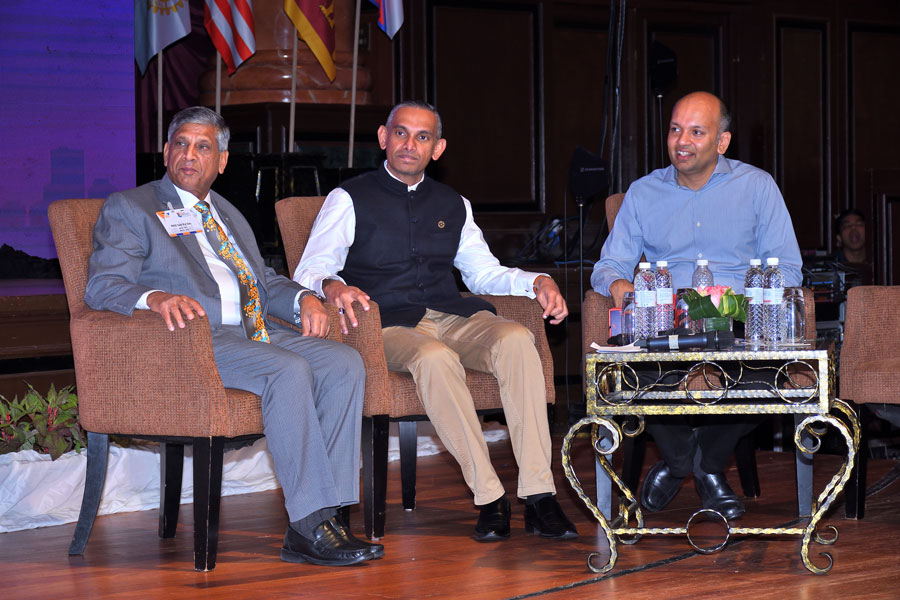
For your clubs to be successful, borrow the local expertise, resources and credibility,” said Dr A T Kumararajah, the Director of Economic and Human Capital Development, SEDIC, Malaysia and the founding-CEO of the Secretariat for Empowerment of Indian Entrepreneurs. He is also past president of RC Greater Kuala Lumpur.
His talk at the KL Institute on leveraging strategic partnerships was based on his experiences and direct interactions with the Government and the Prime Minister himself. Kumararajah summed up his learning with the seven “pillars” that can help build strong strategic partnerships for Rotary clubs too.
- Be local. Address the local needs of the community.
- Select the right partner.
- Engage a key-point person.
- Work with a common denominator for doing good. There should be some sort of a win-win approach that will be beneficial to both contributors. Referring to a government grant that his club worked out recently for setting up a dialysis centre in Malaysia, he related how the Malaysian government also had a similar objective and “contributed RM500,000 and we matched it with an equal amount.”
- Clear objective and execution plan. “Your partners will love to associate with you a second time if you stick to your goals and work with a perfect blueprint.”
- Clear entry and exit point. Nothing lasts forever. Make every project sustainable in its own right and move away at the right moment. “There cannot be any perpetual agreement simply because there is no urgency to deliver.”
- Sustain the interest of your members. Though Rotary is among the top five service organisations, there must be some means to sustain the interest of members, some reason to tie them to the organisation. “In this new world order, one cannot expect loyalty or prestige towards a particular club. Instead, people of the millennium attach stronger ties to a concept,” concluded Kumararajah.
Designing for Service
“My life is an attempt to bring smiles in the world and silence in my heart. I want to live simply, love purely, and give fearlessly. Service doesn’t start when you have something to give; it blossoms naturally when you have nothing left to take.”
So said Nipun Mehta, the founder of servicespace.org, a nonprofit that promotes a culture of volunteerism and generosity in a natural way. His talk was charged with stories of acts of kindness inspired from people such as Mahatma Gandhi and Mother Teresa.
‘Be selfish; be generous’ is the motto he propagated. “Your act of giving lifts up your oxytocin and serotonin levels making you feel good, apart from being beneficial to the receiver. It is impossible to give without receiving.”
He listed out the fundamental insights of giving:
- Everybody is good at something
- Everybody can be great at giving
- As giving gets connected, a gift ecology emerges — it links one by one and you start growing in generosity
- Everyone is connected to everything
- If you start putting price tags for everything, you will lose connection with the ‘priceless’.
Talking about Smile Card, he urged the delegates to try it and experience the happiness it brings. “It is a game where you sponsor another person’s meal or do any anonymous act of kindness for someone; leave a Smile Card behind to encourage them to pay-it-forward,” he explained.
Unite to Win
“Seeing you all here, one thought comes to me: why didn’t I officially join Rotary 40 years ago? I’ve been an honorary Rotarian but that is not the same,” said Shiv Khera, before addressing the Institute on ways to win. He related how he advised his daughter, who recently relocated to Singapore, to join a Rotary club to make friends.
Some takeaways from his address:
If you are depressed, go out and help someone who needs it very badly.
Do something for others who can’t repay you and watch how your self-esteem shoots up.
Self-esteem is achieved by feeling good after doing good to others.
Confidence without humility amounts to arrogance.
While change is constant, three things remain constant: people’s skills, persuasion skills and prioritising skills.
Promise is what you make to others and commitment is what you do yourself.
He signed off with a message on the importance of time. “We often say ‘Time flies’. If time flies, time becomes an aeroplane and you are the pilot. If you can’t control it, you become the passenger.”
Pictures by Rtn Sridhar Bharathy






